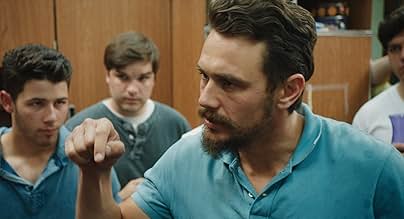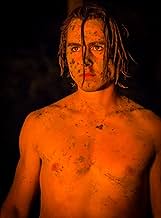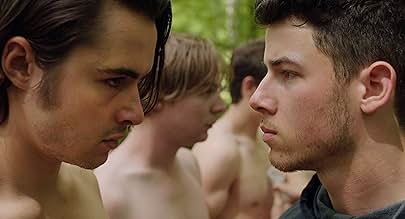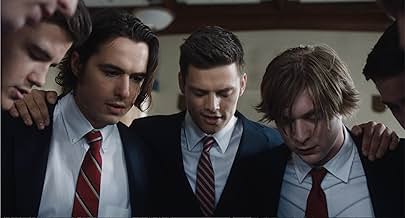NOTE IMDb
5,7/10
8,2 k
MA NOTE
Ajouter une intrigue dans votre langueReeling from a terrifying assault, a 19 year-old enrolls into college with his brother and pledges the same fraternity. What happens there in the name of "brotherhood" tests him and his loya... Tout lireReeling from a terrifying assault, a 19 year-old enrolls into college with his brother and pledges the same fraternity. What happens there in the name of "brotherhood" tests him and his loyalty to his brother in brutal ways.Reeling from a terrifying assault, a 19 year-old enrolls into college with his brother and pledges the same fraternity. What happens there in the name of "brotherhood" tests him and his loyalty to his brother in brutal ways.
- Réalisation
- Scénario
- Casting principal
- Récompenses
- 5 nominations au total
Avis à la une
I screened #GOAT starring #BenSchnetzer and #NickJonas and although the hazings in the film can get over the top, one can't help but wonder if hazings in real life frat out there can really get that violent, especially since the college I attended didn't have Greek houses so I never personally experienced pledges. But GOAT has its own way of rattling your comfort zone. The psychological pain the characters inflict on each other is more disturbing than last year's "The Stanford Prison Experiment."
Directed by Andrew Neel, in GOAT, Ben Schnetzer's character, Brad Land earlier on in the story goes through an initial violence so traumatizing that it pretty much sets up his motivation throughout the entirety of this film. He joins his brother Brett's (Nick Jonas) fraternity and as the pledging ritual moves into hell week, the stakes grow more violent, more humiliating, and more torturous, all in the name of brotherhood, or is Brad trying to prove something else? Based on Brad Land's memoir, co-written by Andrew Neel, David Gordon Green and Mike Roberts, the film deals with the questions of which rites of passage are worth taking and which ones are not and where do you draw the line. There are plenty of hazings in this film, you really don't know what to expect because each of them is shocking in its own way, it becomes ingrained in Brad's psyche or his belief that this may be what is needed to be done for him to punish himself for the earlier event that victimized him. And to some of these brothers, this frat life has become all they know, this is all they have, they think it's the center of the universe so if you go against it, then consequences ensue. It's very intriguing to see Brad and this brotherhood collide and the effect they have on each other.
GOAT is not a college comedy, it shows the darker, harsher side of what college life can offer. It's raw, unforgiving, and it punches you in the gut. You will feel uncomfortable watching GOAT and that is one of the film's main goals. I'd be very interested to see a featurette or behind-the-scenes videos showing how they shot some of the hazing scenes, just to see how the actors mentally prepped for them. I'd like to believe that GOAT doesn't necessarily intend on demonizing frat or Greek houses, I'm sure there are many brotherhoods out there that don't go over the line in their rituals but it does show that when we join a group, any group, it's best to analyze whether or not that group would be beneficial for our personal growth given our previous life experiences.
-- Rama's Screen --
Directed by Andrew Neel, in GOAT, Ben Schnetzer's character, Brad Land earlier on in the story goes through an initial violence so traumatizing that it pretty much sets up his motivation throughout the entirety of this film. He joins his brother Brett's (Nick Jonas) fraternity and as the pledging ritual moves into hell week, the stakes grow more violent, more humiliating, and more torturous, all in the name of brotherhood, or is Brad trying to prove something else? Based on Brad Land's memoir, co-written by Andrew Neel, David Gordon Green and Mike Roberts, the film deals with the questions of which rites of passage are worth taking and which ones are not and where do you draw the line. There are plenty of hazings in this film, you really don't know what to expect because each of them is shocking in its own way, it becomes ingrained in Brad's psyche or his belief that this may be what is needed to be done for him to punish himself for the earlier event that victimized him. And to some of these brothers, this frat life has become all they know, this is all they have, they think it's the center of the universe so if you go against it, then consequences ensue. It's very intriguing to see Brad and this brotherhood collide and the effect they have on each other.
GOAT is not a college comedy, it shows the darker, harsher side of what college life can offer. It's raw, unforgiving, and it punches you in the gut. You will feel uncomfortable watching GOAT and that is one of the film's main goals. I'd be very interested to see a featurette or behind-the-scenes videos showing how they shot some of the hazing scenes, just to see how the actors mentally prepped for them. I'd like to believe that GOAT doesn't necessarily intend on demonizing frat or Greek houses, I'm sure there are many brotherhoods out there that don't go over the line in their rituals but it does show that when we join a group, any group, it's best to analyze whether or not that group would be beneficial for our personal growth given our previous life experiences.
-- Rama's Screen --
The title and promotional photo of this film serve as early warnings that this is going to be an unpleasant story, especially because it's not labeled a comedy as many frat movies tend to be.
This is the story of Brad, a sweet guy from the midwest, who joins his real-life brother's fraternity. Having gone through the college fraternity experience myself, I can attest to this film's realistic portrayal of hell week and brotherhood. But the story, as good as the acting is, lacks insight into why the brothers continue putting pledges through horrific initiations year after year. We get no view into what the active brothers are plotting each day and why. Neither are we privy to their conversations outside the hazing. There's brief conflict between Jonas and his peers, but it's so short, and it would have been natural to dig into more intra-brother conflict as to the absurdity of hell week.
The entire middle act of the film focuses on one hazing incident after another. The result is a film that largely treads water until it hits the crisis (one of the pledges doesn't make it), the climax (an investigation) and ultimate resolution, which is weak at best. We also get no interaction between the fraternity and the rest of the campus or community, which gives the film an odd isolation. But I get it ... the director/writer/producers wanted to keep the story strictly focused on the fraternity.
That said, superb performances by Jake Picking, who plays Dixon, the frat president, Nick Jonas and Ben Schnetzer (a rising young actor who shows real promise). I've always like Jonas subtle, nuanced performances, where he displays a natural affinity for the screen. He never looks like he's acting.
Schnetzer does an excellent job playing little brother, but trying hard to be his equal.
This is the story of Brad, a sweet guy from the midwest, who joins his real-life brother's fraternity. Having gone through the college fraternity experience myself, I can attest to this film's realistic portrayal of hell week and brotherhood. But the story, as good as the acting is, lacks insight into why the brothers continue putting pledges through horrific initiations year after year. We get no view into what the active brothers are plotting each day and why. Neither are we privy to their conversations outside the hazing. There's brief conflict between Jonas and his peers, but it's so short, and it would have been natural to dig into more intra-brother conflict as to the absurdity of hell week.
The entire middle act of the film focuses on one hazing incident after another. The result is a film that largely treads water until it hits the crisis (one of the pledges doesn't make it), the climax (an investigation) and ultimate resolution, which is weak at best. We also get no interaction between the fraternity and the rest of the campus or community, which gives the film an odd isolation. But I get it ... the director/writer/producers wanted to keep the story strictly focused on the fraternity.
That said, superb performances by Jake Picking, who plays Dixon, the frat president, Nick Jonas and Ben Schnetzer (a rising young actor who shows real promise). I've always like Jonas subtle, nuanced performances, where he displays a natural affinity for the screen. He never looks like he's acting.
Schnetzer does an excellent job playing little brother, but trying hard to be his equal.
Being in a fraternity myself I could relate to the abuse that's portrayed in the film. Well done but maybe a little loud and manic. Nice cameo by James Franco too. Not something you'd wanna watch twice...
I saw this film in the early hours of the morning on British television, without any recommendation to watch it. It was one of the most necessary, and at the same time one of the most brutal films I have ever seen. I do not want to give away spoilers, but the opening credits of half naked men shouting warned me that this was not going to be entertainment, and the opening scenes of a young man being beaten almost to death made me want to turn the film off. I watched it and followed this young man's path to recovery, and along with his brother entering an elite school for further education. Here the real horror began. He had to prove his worth by being 'hazed' which is as I understood it a ritual of various tortures to become 'worthy' of being there. The tortures and the verbal abuse I will not describe, except to say that it was like watching pages of description out of De Sade. The most used of the verbal abuses was anti-gay, along with others used against women. This was the heart, if that is the appropriate word, of the film, along with physical humiliation and torture. Not since Pasolini's 'Salo' have I seen a film like this; another condemnation of human nature that was equally necessary to see and try to understand. The film, as film, is in my opinion equal to Pasolini both for its cinematic merits, and also for daring to go into the lowest depths of humanity. I expected a very violent climax, but instead I saw the young man trying to come to terms with what he has been through. I must just add that there was no disjunction between the opening violence, and the violence in the school. As far as I could see they completed the circle of extreme torture filtering down from the top of society to the most dispossessed in our society. Necessary films are actually quite few, but this in my opinion is one of them. A fully justified 10 for its content, and what it tells us about aspects of human behaviour we would rather turn away from.
There is one review that describes GOAT as "Full Metal Jacket meets Animal House," which might be true if this movie were at all a comedy, or even a movie that examines the long-term effects of psychological abuse. There is a lot that Andrew Neel tries to say from the director's chair, but aside from a few interesting moments here and there, it seems like he may have bitten off more than he can chew.
The story follows Brad (Ben Schnetzer), the older brother of an all-around popular college boy (Brett, played by Nick Jonas). The film opens with Brad offering a ride to a set of strangers in the dead of night. He offers only because he believes they are coming from the same party. Right away the suspicions are tingling. A 20-minute ride down a deserted road finally has Brad come to terms with his situation: that he is mugged, beaten, and left for death in the middle of a field on the outskirts of town. His face is scarred, bruised, and his ease with strangers is never the same.
The movie is something I was not expecting, an odyssey into the mind of fear along the lines of a film Harmony Korine might admire. Where I was prepared for an dark yet entertaining film like Whiplash, we delve into the bowels of a film that more closely resembles "Spring Breakers," another hypnotic story with similar themes of the recklessness of millennials.
As the story falls into place, Brad finally decides to start college (we assume he took a year off after high school, since his younger brother is already well into his degree). Even before classes begin, Brad attends a Fall party at Brett's fraternity. The house is run- down, jammed, full of empty plastic cups and vomit in every corner. It's not so much a symbol as a right of passage: to belong to this house is to have a brotherhood that always has your back. James Franco (a producer on the film) has a brief but memorable scene as a former classmate who seems to hang around at the house a couple hours too long. Stuck in the past, he nonetheless shows Brad that this is an institution to which you can belong and be protected.
And so begins the odyssey. "Hell Week," as it's notoriously dubbed, is the hazing process where Brad, his roommate, and others, attempt to win the trust of the fraternity and eventually get "pinned" before the school year is out. The name is aptly given. Pledges are brought down to the basement where they are stripped, tied up, urinated on, and made to drink to the point of nausea. They drink cups of hot sauce. They are slapped. This is only day one.
The comparison to "Full Metal Jacket" would seem appropriate on a surface level, but the film rarely dives into the psyche of Brad, a boy who is torn between fear and commitment to pleasing his brother. Just as he allowed strangers to abuse him in the film's opening, so does he (poetically) allow it to happen again, this time for acceptance. In fact, maybe the abuse comes to represent a window into the connected world. Life is full of people who come and go, but what's the true test of a friendship if you literally go to hell and back.
The abuse, of course, is the highlight of the film, and the vivid scenes of torture are at times a bit overwhelming. We know going in that this is a movie based on actual events (events in which the death of a student was the culmination of the abuse), and as such each new scene comes with a heightened sense of dread: will this turn deadly? The violence is so relentless that I doubted I would even end this film with a positive thing to say about it. Filmmaking and production is one thing, but if you are making a movie about violence solely for the sake of violence, then what is the point?
I found Schnetzer's performance something that was both fragile and determined. While I at times failed to see motivation in certain scenes, his portrayal of Brad is fully-realized and the basic moral compass of the movie. From beginning to end, the story can be simplified to that of a boy who learns to no longer be afraid. It's a small arc, muddled in with a plot of hazing that does very little for the cause of the overall picture. On an intimate level, this was a story I could get behind. Everyone likes a happy ending, don't they?
The story follows Brad (Ben Schnetzer), the older brother of an all-around popular college boy (Brett, played by Nick Jonas). The film opens with Brad offering a ride to a set of strangers in the dead of night. He offers only because he believes they are coming from the same party. Right away the suspicions are tingling. A 20-minute ride down a deserted road finally has Brad come to terms with his situation: that he is mugged, beaten, and left for death in the middle of a field on the outskirts of town. His face is scarred, bruised, and his ease with strangers is never the same.
The movie is something I was not expecting, an odyssey into the mind of fear along the lines of a film Harmony Korine might admire. Where I was prepared for an dark yet entertaining film like Whiplash, we delve into the bowels of a film that more closely resembles "Spring Breakers," another hypnotic story with similar themes of the recklessness of millennials.
As the story falls into place, Brad finally decides to start college (we assume he took a year off after high school, since his younger brother is already well into his degree). Even before classes begin, Brad attends a Fall party at Brett's fraternity. The house is run- down, jammed, full of empty plastic cups and vomit in every corner. It's not so much a symbol as a right of passage: to belong to this house is to have a brotherhood that always has your back. James Franco (a producer on the film) has a brief but memorable scene as a former classmate who seems to hang around at the house a couple hours too long. Stuck in the past, he nonetheless shows Brad that this is an institution to which you can belong and be protected.
And so begins the odyssey. "Hell Week," as it's notoriously dubbed, is the hazing process where Brad, his roommate, and others, attempt to win the trust of the fraternity and eventually get "pinned" before the school year is out. The name is aptly given. Pledges are brought down to the basement where they are stripped, tied up, urinated on, and made to drink to the point of nausea. They drink cups of hot sauce. They are slapped. This is only day one.
The comparison to "Full Metal Jacket" would seem appropriate on a surface level, but the film rarely dives into the psyche of Brad, a boy who is torn between fear and commitment to pleasing his brother. Just as he allowed strangers to abuse him in the film's opening, so does he (poetically) allow it to happen again, this time for acceptance. In fact, maybe the abuse comes to represent a window into the connected world. Life is full of people who come and go, but what's the true test of a friendship if you literally go to hell and back.
The abuse, of course, is the highlight of the film, and the vivid scenes of torture are at times a bit overwhelming. We know going in that this is a movie based on actual events (events in which the death of a student was the culmination of the abuse), and as such each new scene comes with a heightened sense of dread: will this turn deadly? The violence is so relentless that I doubted I would even end this film with a positive thing to say about it. Filmmaking and production is one thing, but if you are making a movie about violence solely for the sake of violence, then what is the point?
I found Schnetzer's performance something that was both fragile and determined. While I at times failed to see motivation in certain scenes, his portrayal of Brad is fully-realized and the basic moral compass of the movie. From beginning to end, the story can be simplified to that of a boy who learns to no longer be afraid. It's a small arc, muddled in with a plot of hazing that does very little for the cause of the overall picture. On an intimate level, this was a story I could get behind. Everyone likes a happy ending, don't they?
Le saviez-vous
- AnecdotesBased on the true story and memoir by Brad Land.
- Bandes originalesJack Move
Performed by Craig Craig
Courtesy of Format
Meilleurs choix
Connectez-vous pour évaluer et suivre la liste de favoris afin de recevoir des recommandations personnalisées
- How long is Goat?Alimenté par Alexa
Détails
Box-office
- Montant brut aux États-Unis et au Canada
- 23 020 $US
- Week-end de sortie aux États-Unis et au Canada
- 23 020 $US
- 25 sept. 2016
- Montant brut mondial
- 23 020 $US
- Durée1 heure 36 minutes
- Couleur
- Rapport de forme
- 1.85 : 1
Contribuer à cette page
Suggérer une modification ou ajouter du contenu manquant





































